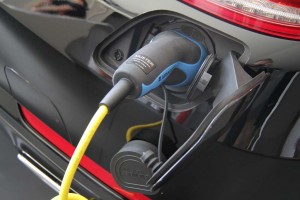
The failure to pass tax breaks, including one for electric vehicle chargers, could cause the battery car business to come unplugged, warn advocates.
The action – or more accurately, the lack of action – by Congress has been blamed for many things this past, gridlocked year. To the list add the potential for the electric vehicle market to come unplugged.
Lawmakers have headed home for the New Year’s break allowing a package of 55 generally popular tax breaks expire, an issue that creates potential headaches and added costs for those who drink imported rum, those who use mass transit – as well as the railroads trying to maintain their rights of way – film producers, companies investing in R&D, and even teachers who buy supplies for their classrooms. Also affected are those interested in purchasing electric vehicles.
While the tax credits for buying a battery car remain in effect, two other government incentives will expire at midnight: one providing a 30% tax credit for the purchase of a high-speed electric vehicle charger, up to $1,000. The other covers 10% of the cost, up to $2,500, for the purchase of an electric motorcycle.
“It’s shameful” for Congress to head home without acting on the tax breaks, lamented Georgia’s Congressman John Lewis, a senior Democrat on the House Ways and Means Committee, which oversees tax laws.
It’s not the first time the various tax credits have been allowed to expire, a situation that has become more routine as Congress has become increasingly polarized. But Cong. Lewis noted that it can make things difficult for businesses, investors and average citizens to plan spending when they don’t know whether they might be in for credits later should lawmakers finally take action.
“These incentives are really, really key” to helping boost demand for electric vehicles, Jay Friedland, the legislative director for the group Plug In America, told USA Today.
(Click Here to check out the newest, award-winning green car technologies.)
The failure to renew the package of federal incentives makes it just a bit more costly for those who want an electric vehicle since it could add up to $1,000 to the price tag for installing a 220-volt charger. Those are critical for those who want to avoid extended waits once a vehicle’s battery runs down. On some models, such as the Ford C-Max Energi or Nissan Leaf, switching to 220 power can trim charging time from 10 to 16 hours down to anywhere from 3 to 6.
The potential impact isn’t limited to individuals, either. It could reduce the incentive for apartment building owners and other businessmen to install multiple chargers on their property. The soon-to-expire measure offered them as much as $30,000 in credits.
(VW teams up with Protean on potential battery-car breakthrough. Click Here to learn more.)
The good news for the struggling electric vehicle industry is that tax credits of up to $7,500 remain in effect for those who buy battery-cars. But Congress notably has failed to act on proposals by the Obama White House to not only increase those incentives but to make them available to buyers immediately, rather than having to wait as much as a year, to when a purchaser files their taxes.
The failure to renew the tax breaks could also be a painful blow to the emerging electric motorcycle industry, since it could add as much as 10% to the cost of buying a battery bike.

Congress has a LOT to be ashamed off especially in 2013. That being said there should not be ANY tax breaks for buying an electric vehicle but those who do buy EVs should be charged an annual road tax like everyone else who uses the roadways and pays via fuel taxes.
City, state and Federal governments should also NOT be paying for an EV charging infrastructure. If there is enough demand then local utility companies will build charging stations just like oil companies built gas stations. General utility customers should not be paying for the construction of EV charging systems. They should be paid for by users of such systems, i.e. EV owners.